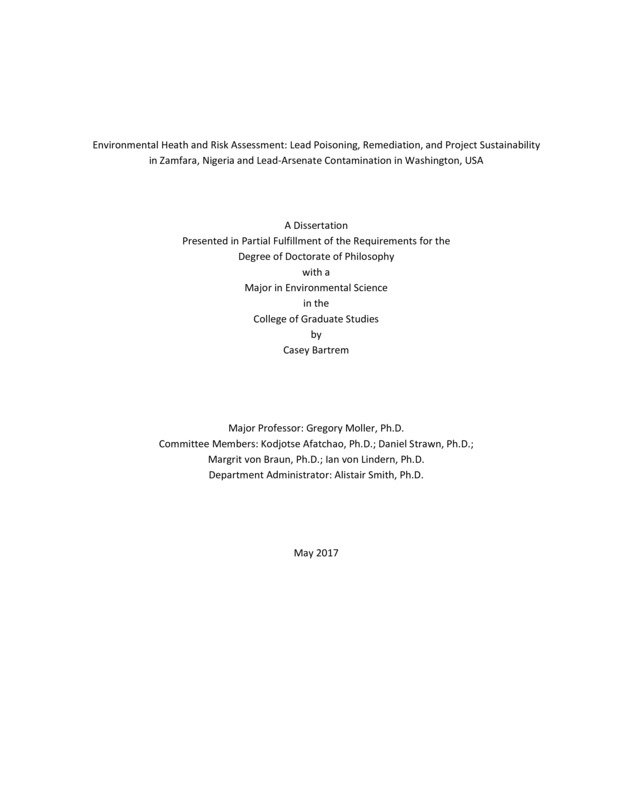Environmental Heath and Risk Assessment: Lead Poisoning, Remediation, and Project Sustainability in Zamfara, Nigeria and Lead-Arsenate Contamination in Washington, USA
Bartrem, Casey. (2017). Environmental Heath and Risk Assessment: Lead Poisoning, Remediation, and Project Sustainability in Zamfara, Nigeria and Lead-Arsenate Contamination in Washington, USA. Theses and Dissertations Collection, University of Idaho Library Digital Collections. https://www.lib.uidaho.edu/digital/etd/items/bartrem_idaho_0089e_11115.html
- Title:
- Environmental Heath and Risk Assessment: Lead Poisoning, Remediation, and Project Sustainability in Zamfara, Nigeria and Lead-Arsenate Contamination in Washington, USA
- Author:
- Bartrem, Casey
- Date:
- 2017
- Keywords:
- Artisanal Mining Children's Health Heavy Metals Lead Remediation Risk Assessment
- Program:
- Environmental Science
- Subject Category:
- Environmental health; Environmental science; Environmental justice
- Abstract:
-
The global burden of environmental disease is increasingly and inequitably carried by low-income nations. In Zamfara State, Nigeria, spikes in gold prices driven by the world economic crisis caused an epidemic of severe lead poisoning, where 400 children died and thousands more suffered irreversible damage. The outbreak is an unprecedented crisis, and the long-term prognosis for future generations is unclear. Risk assessment identified incidental ingestion of contaminated soil and dust as the primary route of exposure. Post-harvest contamination of staple foods also resulted in significant dietary exposures. While lead was the risk driver for environmental and medical intervention, arsenic, cadmium, manganese, and mercury are also of concern as co-exposures to multiple toxicants often have synergistic effects. International groups and Nigerian governments undertook a collaborative, interdisciplinary response, including emergency removal of contaminated soils and medical treatment. The team worked in ten villages over seven years as the project transitioned from an emergency life-saving intervention to a comprehensive, long-term environmental health response. During this period, four remedial effectiveness evaluations were initiated to review project sustainability. These evaluations identified intentional and unintentional project impacts and the influence of social factors on the long-term resilience of the intervention.
The strides in environmental health and safety achieved in high-income countries have come at the expense of the health of low-income nations such as Nigeria. Within the United States, environmental burdens are also inequitably distributed. In central Washington, apple orchards were heavily treated with lead-arsenate insecticide from 1900-1950, resulting in significant soil contamination. Former orchard lands were later converted to residential, public, and commercial properties. The widespread lead and arsenic contamination has largely been ignored by the state government in favor of addressing contamination in wealthier regions of the state, putting marginalized residents – especially children – at risk of exposure to contaminated soils.
In central Washington and Zamfara, understanding exposure routes, dose/response relationships, and social influences on contaminant distribution and risk can aid the scientific and public health communities to better understand, prevent, and respond to the increasing incidence of environmental health crises.
- Description:
- doctoral, Ph.D., Environmental Science -- University of Idaho - College of Graduate Studies, 2017
- Major Professor:
- Moller, Gregory
- Committee:
- Afatchao, Kodjotse; Strawn, Daniel; von Braun, Margrit; von Lindern, Ian
- Defense Date:
- 2017
- Identifier:
- Bartrem_idaho_0089E_11115
- Type:
- Text
- Format Original:
- Format:
- application/pdf
- Rights:
- In Copyright - Educational Use Permitted. For more information, please contact University of Idaho Library Special Collections and Archives Department at libspec@uidaho.edu.
- Standardized Rights:
- http://rightsstatements.org/vocab/InC-EDU/1.0/

